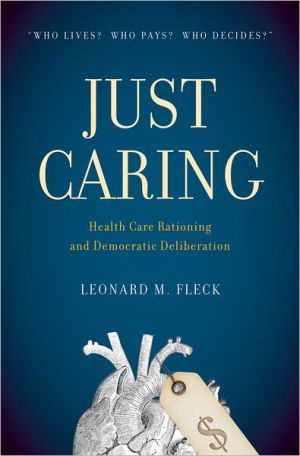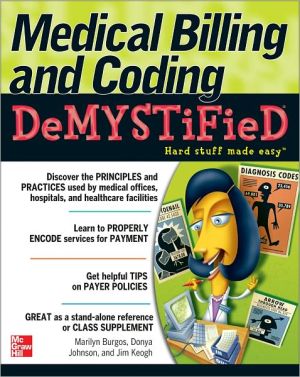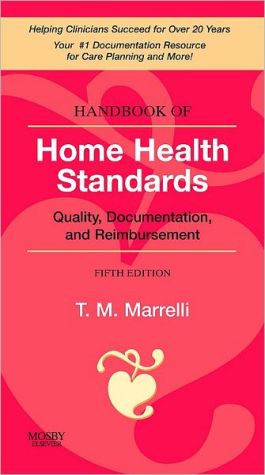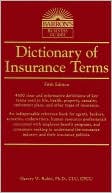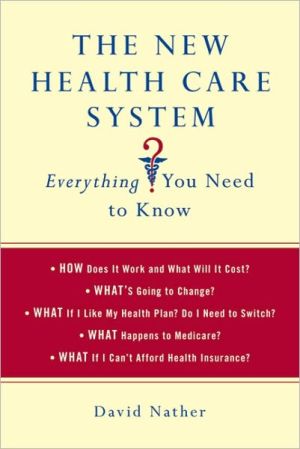Just Caring: Health Care Rationing and Democratic Deliberation
What does it mean to be a "just" and "caring" society when we have only limited resources to meet unlimited health care needs? Do we believe that all lives are of equal value? Is human life priceless? Should a "just" and "caring" society refuse to put limits on health care spending?\ In Just Caring, Leonard Fleck reflects on the central moral and political challenges of health reform today. He cites the millions of Americans who go without health insurance, thousands of whom die prematurely,...
Search in google:
What does it mean to be a "just" and "caring" society when we have only limited resources to meet unlimited health care needs? Do we believe that all lives are of equal value? Is human life priceless? Should a "just" and "caring" society refuse to put limits on health care spending? In Just Caring, Leonard Fleck reflects on the central moral and political challenges of health reform today. He cites the millions of Americans who go without health insurance, thousands of whom die prematurely, unable to afford the health care needed to save their lives. Fleck considers these deaths as contrary to our deepest social values, and makes a case for the necessity of health care rationing decisions. The core argument of this book is that no one has a moral right to impose rationing decisions on others if they are unwilling to impose those same rationing decisions on themselves in the same medical circumstances. Fleck argues we can make health care rationing fair, in ways that are mutually respectful, if we engage in honest rational democratic deliberation. Such civic engagement is rare in our society, but the alternative is endless destructive social controversy that is neither just nor caring. Doody Review Services Reviewer:Daniel Bustillos, JD, PhD(Saint Louis University)Description:A renowned expert on rational democratic deliberation and health reform tackles the important issue of distributive justice in healthcare. He argues persuasively that healthcare rationing is ongoing and necessary and that public deliberation on this issue is a moral as well as an economic imperative.Purpose:The author argues for a more democratic and inclusive public discourse about the hard issue of healthcare rationing. The book shows that a society that considers itself "just" and "caring" has an ethical as well as an economic responsibility to address the inescapable reality of rationing in a transparent and fair way. Ideally this debate, the author argues, will be both sensitive to the real-world needs and wants of patients, as well as responsive to fiscal realities and responsible stewardship of finite resources.Audience:This book, though dealing with a very populist principle, is an unforgiving read for a lay audience. It is more appropriate for serious students and scholars of healthcare reform and medical ethics. I suspect that even many healthcare professionals interested in this issue may find it too dense. It is, however, a very rewarding and thoughtful treatise for the careful and dedicated reader.Features:This comprehensive monograph on healthcare rationing takes a hard look at this most disagreeable but necessary of healthcare issues and does so unflinchingly. The author does not, however, take a hard line tack, but tailors the procedural justice arguments of others for the emotional, day-to-day decisions that must be made in medicine. He introduces concepts such as "just enough" to help "soften" what might otherwise be a brittle procedural apparatus and thus makes it responsive to human reality as well as economic principle. This, some will argue, makes the author's proposals overly complicated or unsettlingly indeterminate. But the provisional, hesitant outcomes of this democratic, deliberative process will undoubtedly be more responsive to the lived experiences and intuitive moral judgments of real people than more formal systems of distributive justice.Assessment:This should prove a very useful and important contribution to the field of healthcare reform, though since the book may reward only the meticulous and sophisticated reader, the form may undercut its populist function. However, the inherent messiness of the subject is probably too often ill-served by books and articles that reduce it to a tidy zero-sum game and thus this may be one of the few honest books dedicated to healthcare rationing in the United States.
\ From The CriticsReviewer: Daniel Bustillos, JD, PhD(Saint Louis University)\ Description: A renowned expert on rational democratic deliberation and health reform tackles the important issue of distributive justice in healthcare. He argues persuasively that healthcare rationing is ongoing and necessary and that public deliberation on this issue is a moral as well as an economic imperative.\ Purpose: The author argues for a more democratic and inclusive public discourse about the hard issue of healthcare rationing. The book shows that a society that considers itself "just" and "caring" has an ethical as well as an economic responsibility to address the inescapable reality of rationing in a transparent and fair way. Ideally this debate, the author argues, will be both sensitive to the real-world needs and wants of patients, as well as responsive to fiscal realities and responsible stewardship of finite resources.\ Audience: This book, though dealing with a very populist principle, is an unforgiving read for a lay audience. It is more appropriate for serious students and scholars of healthcare reform and medical ethics. I suspect that even many healthcare professionals interested in this issue may find it too dense. It is, however, a very rewarding and thoughtful treatise for the careful and dedicated reader.\ Features: This comprehensive monograph on healthcare rationing takes a hard look at this most disagreeable but necessary of healthcare issues and does so unflinchingly. The author does not, however, take a hard line tack, but tailors the procedural justice arguments of others for the emotional, day-to-day decisions that must be made in medicine. He introduces concepts such as "just enough" to help "soften" what might otherwise be a brittle procedural apparatus and thus makes it responsive to human reality as well as economic principle. This, some will argue, makes the author's proposals overly complicated or unsettlingly indeterminate. But the provisional, hesitant outcomes of this democratic, deliberative process will undoubtedly be more responsive to the lived experiences and intuitive moral judgments of real people than more formal systems of distributive justice.\ Assessment: This should prove a very useful and important contribution to the field of healthcare reform, though since the book may reward only the meticulous and sophisticated reader, the form may undercut its populist function. However, the inherent messiness of the subject is probably too often ill-served by books and articles that reduce it to a tidy zero-sum game and thus this may be one of the few honest books dedicated to healthcare rationing in the United States.\ \
